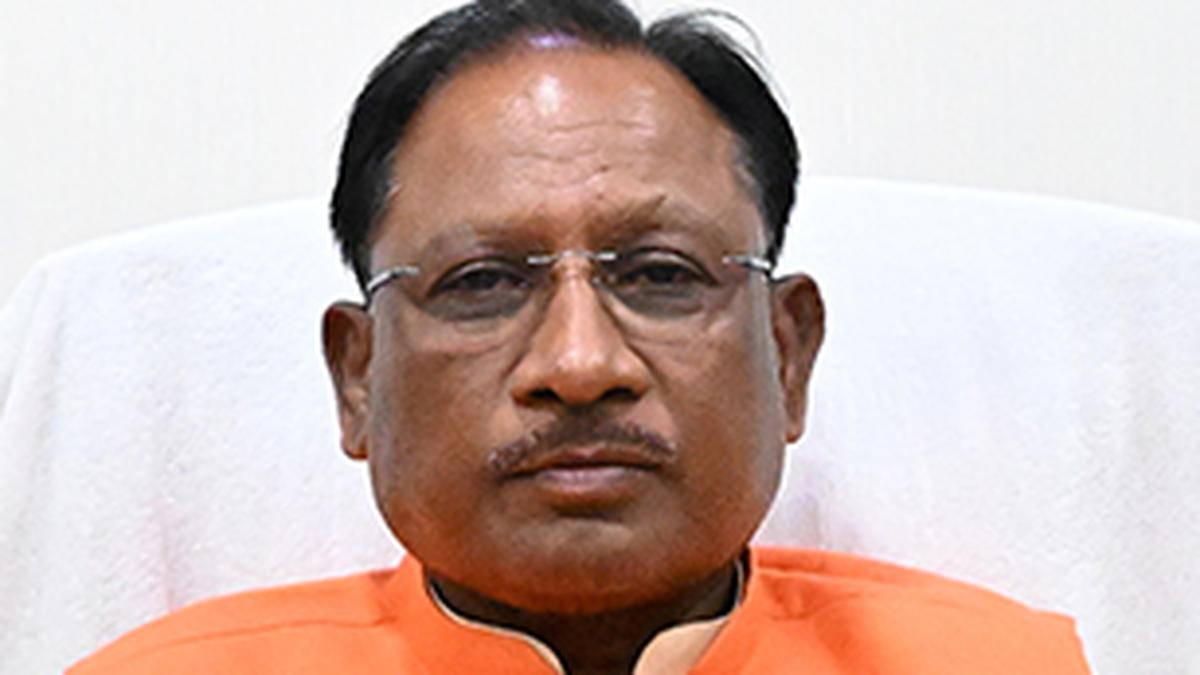By Shubhomoy Sikdar
Copyright thehindu

In recent months, the Chhattisgarh government is attempting to present the State as an attractive investment destination through investors’ meetings that you have attended both in India and abroad. What sectors have been given priority, and how many jobs do you anticipate will be generated as a result?
After the launch of our new industrial policy, we organised ‘investor connect’ events in places such as Delhi, Bengaluru, Mumbai, and abroad, including in Tokyo and Osaka in Japan, and Seoul in South Korea, to promote it. It is a very good policy. As a result, we have received investment proposals worth approximately ₹7 lakh crore in just 10 months, and work on some of these projects has already begun. Many more industries are expected to come in the future, and all sectors have been given focus. We have also focused on tribal-majority regions like Bastar and Surguja. The new industrial policy provides special incentives for investments of ₹1,000 crore or more, or for companies that provide employment to more than 1,000 people. It is being widely appreciated, and its benefits will be increased investment and employment opportunities for our youth.
Is there a specific vision for Bastar, given that an armed conflict has been going on there for a long time?
Absolutely. In Bastar, tourism is a focus area because of its natural beauty. It has waterfalls and dense forests. In our new industrial policy, we have given tourism the status of an industry. Homestays are very popular; tourists, especially foreigners, stay in people’s homes; they stay with families for a month bringing economic benefits for the locals. We also want to promote agriculture because the tribal communities and villagers in the area have a particular interest in farming. We want to ensure irrigation for fields and also promote animal husbandry. From June 1st, we are distributing two cows to each family, and [for this] the government has an agreement with the National Dairy Development Board.
Naxalism was a major obstacle to implementing this. But, in the last 19-20 months, we have been successful in eliminating it, and the double-engine government has played a significant role in it. The Hon’ble Prime Minister and the Hon’ble Home Minister have vowed to eradicate Naxalism by March 31 next year, and the entire country is witnessing how our soldiers have been fighting Naxalism with full dedication for the past 19 months. We are achieving continuous success, and many top Naxalite leaders have been neutralised. So, we can say that Naxalism has been crippled. It is gasping for its last breath, and the resolve of the Prime Minister and the Home Minister will surely be fulfilled. After this, we want to bring development to that area, for which 38-40 security camps have been established. Even during the rainy season, eight to nine new security camps have been opened. Earlier, the coverage of a security camp was a radius of 5 km, but our Hon’ble Home Minister has increased it to 10 km. With such a large radius, Naxalites cannot escape. We are also running a scheme called ‘Niyad Nellanar’ or ‘Beautiful Village’, under which we are implementing all government schemes there. Roads are being built; electricity and water are being supplied; schools and hospitals are being constructed; and ration cards are being issued. Ration and telecommunication facilities are also reaching there. In this way, we are bringing development to that area.
But there has been criticism of these security operations too. Social organisations from across the country have written letters, and politicians like former Chief Minister of Telangana K. Chandrasekhar Rao have objected, claiming that youths and tribals are being killed.
All of these actions are genuine. There is no basis for denying it. The operations have been ongoing for a long time, almost 18-19 months. When Maoists are neutralised, weapons are also recovered.
Despite the state inflicting heavy losses on the Maoists, killings of civilians continue in the interior areas of Bastar. We have recently seen targeted killings of school teachers. Does the government have a concrete plan for their security?
See, the Maoists are doing all this out of desperation. Their grip is weakening, their power is crumbling, and they are on their last legs. So, they are resorting to these desperate measures. If you look at the history, earlier we also suffered heavy casualties. Our security forces’ personnel were being martyred in large numbers. But now, very few of our soldiers are being killed, and almost all the casualties are on the Maoist side.
In the past few days, there have been multiple letters attributed to the CPI (Maoist) in which divergent views have emerged about the outfit temporarily abandoning the armed struggle? Do you feel there is still room for negotiations?
We have kept the path of dialogue open from the beginning. Since we came to power, we have been saying that you should abandon violence, stop the firing, and join the mainstream of development. Your firing will achieve nothing. Surrender. The government will do justice to you and bring a good rehabilitation policy for you. And we have also tried to do that. Our Home Minister has visited several States, studied their policies, and we believe we have formulated the best rehabilitation policy for the Maoists. We are providing skill training and employment opportunities to those who surrender. We are giving them ₹10,000 per month for two-three years. We are also providing them land for building houses in urban areas and land for farming in villages. So, we have a good rehabilitation policy, and we have also approved 15,000 houses for them under the Pradhan Mantri Awas Yojana (Prime Minister’s Housing Scheme).
Another emerging issue related to Bastar is that there are often conflicts between Christian and non-Christian tribal communities over burial rights. What according to you is a possible solution to this problem?
Well, we are bringing in a strict law on religious conversion, and this rule will come into effect during the upcoming winter session of the State Assembly. We believe this will definitely make a difference.
No one should force religious conversion. Our country is secular, and there is no objection to someone voluntarily choosing any religion. But using someone’s illiteracy or poverty as a tool or using promises of miracles or services to manipulate and coerce people into converting—that is not right. This should be stopped.
But such laws also bring forth allegations that they curb religious freedom…
That is absolutely not true. In the new law, we are introducing a requirement that an application must be submitted, and permission must be obtained before anyone changes their religion.
After his son was arrested by the ED (Enforcement Directorate) in connection with the money laundering case linked to the alleged liquor scam, former CM and senior Congress leader Bhupesh Baghel claimed that the ruling party targeted him because he opposed tree felling for mining in Chhattisgarh. What’s your response?
There is absolutely no merit in that argument. His son’s bail has been rejected repeatedly, and everyone should have faith in the judiciary. The way the previous government carried out scams during its five-year term—it was not just one scam, but they committed scams in everything for five whole years. They only looted Chhattisgarh, and today, not just one, but many of their people are in jail. What does that prove? This is just baseless, with no substance.
The BJP government in the State under your leadership recently expanded its Cabinet. The constitutional validity of its current size of 14 Ministers has now been challenged by the Congress in court. Please share your opinion?
It is a matter before the court, and whatever decision comes will be valid. There are other States with 90 Assembly seats and 14 Ministers.
How do you see the new GST (Goods and Services Tax) reforms of the central government in the context of Chhattisgarh?
The biggest benefit is that the cess of ₹400 per tonne on coal has been abolished and included in GST, half of which will come to us. This will generate revenue of several thousand crores for Chhattisgarh – this is the biggest advantage for our State. Having said that, we are holding meetings with traders and consumers for the last two days, and they are happy. The prices of daily essentials have come down. Business and industry will also benefit from this. Our State of Chhattisgarh is the rice bowl of India, and the prices of agricultural equipment like tractors have also decreased by ₹35,000 to ₹60,000. Pesticide prices have also fallen. This reduction in input costs will benefit the farmers.
You have won three elections in a row. What do you think are the reasons for this?
See, the Bharatiya Janata Party does what it says. The Hon’ble Prime Minister’s slogan is ‘Sabka Saath, Sabka Vikas, Sabka Vishwas, Sabka Prayas’ (togetherness for all, development for all, trust for all, endeavour for all). We also work based on this principle. The schemes we implement are also supported by the Hon’ble Prime Minister, and our government implements them wherever it has jurisdiction. We have reached every corner of the State. In Chhattisgarh, we have fulfilled all the promises made by Prime Minister Narendra Modi, whether it is the 18 lakh houses under the Pradhan Mantri Awas Yojana, the promises made to farmers, or the monthly financial assistance of ₹500 to 70 lakh women under the Mahatari Bandhan Yojana. We have increased the price of tendu leaves, started the Ramlala Darshan Yojana, and given ₹10,000 to over 562,000 landless agricultural laborers. Regarding the CGPSC (Chhattisgarh Public Service Commission) scam, due to which the future of our children was jeopardised, the CBI is investigating it as promised by the Prime Minister. People have more trust in the party and our government because they know we deliver on our promises.
One of your promises was one lakh government jobs. What progress has been made on that front in the last 18 months? How many jobs have been given so far?
See, recruitment is happening continuously. In the last 18-19 months, we believe that around 9,000 to 10,000 people have been recruited in various departments. The police department, the electricity department, the cooperative department, and many other departments have vacancies. Our focus in the new industrial policy is also on job creation. We discussed this today, and we plan to organise a job fair in the near future.
The State is celebrating its 25th anniversary. Progress has been made, but it still remains one of the most backward areas in the country. Have the goals set for a separate Chhattisgarh been achieved?
There has been considerable development in the last 25 years. I have been involved in public service since before the formation of Chhattisgarh. I have witnessed the development since I was an MLA in undivided Madhya Pradesh. There was nothing here then. People died of hunger in Chhattisgarh before its formation. People here used to eat mahua, kodo, and kutki grains. What could be more shameful than that? Forget about roads, electricity, and water; people died of hunger. When we were MLAs in undivided Madhya Pradesh, four people died of hunger in my own Jashpur district, which was then part of Raigarh district. A team from the Legislative Assembly was formed, and they confirmed that four people had indeed died of hunger. After the formation of Chhattisgarh, when our government came to power under the leadership of Dr. Raman Singh, and we started providing grain at ₹1 per kg, there is no hunger anywhere today. I don’t think there can be a bigger achievement than this—ending hunger. Later, the late Atal Bihari Vajpayee formed the State of Chhattisgarh, and he started the Pradhan Mantri Gram Sadak Yojana (Prime Minister’s Rural Roads Scheme), through which all villages are now connected.
The first need for development is roads. No development is possible without roads. Today, all development work is happening there, and ration is also being distributed. There has been development in the region, for example, in education. There was nothing in education before, but when our government (under Raman Singh) was in power for 15 years, all the premier educational institutions came here—IIT, IIM, IIIT, AIIMS, etc. Today, there are 18-19 universities. Look at electricity; we generate 30,000 megawatts of electricity. We are a zero power cut State, and all this became possible only after the formation of the State of Chhattisgarh.



